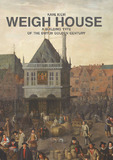Citation link:
http://dx.doi.org/10.25819/ubsi/39Files in This Item:
| File | Description | Size | Format | |
|---|---|---|---|---|
| Karl_Kiem_Weigh_House_2nd_edition.pdf | 70.89 MB | Adobe PDF |  View/Open |
| Dokument Type: | Book | metadata.dc.title: | Weigh house : a building type of the Dutch Golden Century (2nd edition) | Authors: | Kiem, Karl | Free keywords: | Monofunctional, Dutch culture, Weigh House | Dewey Decimal Classification: | 720 Architektur | GHBS-Clases: | WZT | Issue Date: | 2019 | Publish Date: | 2019 | Source: | Zugl.: Siegen : universi - Universitätsverlag Siegen, 2019. - ISBN 978-3-9182-037-5 | Abstract: | The weigh house, a unique architectural typology, was integral to Dutch culture throughout the seventeenth and eighteenth centuries. This typology is almost exclusively found in the provinces of Holland and Friesland. It is not surprising that the most famous painters of this period resided in these two provinces, as these territories formed the economic and cultural center of the Republic of the United Netherlands. The weigh house developed into an independent architectural typology during the so-called Golden Century. Generally speaking, the weigh house can be seen as the architectural equivalent of Rembrandt and Vermeer’s artistic works. |
Description: | 2. Auflage |
DOI: | http://dx.doi.org/10.25819/ubsi/39 | URN: | urn:nbn:de:hbz:467-14831 | URI: | https://dspace.ub.uni-siegen.de/handle/ubsi/1483 | License: | https://dspace.ub.uni-siegen.de/static/license.txt |
| Appears in Collections: | Publikationen aus der Universität Siegen Universi |
This item is protected by original copyright |
Page view(s)
1,009
checked on Nov 25, 2024
Download(s)
396
checked on Nov 25, 2024
Google ScholarTM
Check
Altmetric
Items in DSpace are protected by copyright, with all rights reserved, unless otherwise indicated.

